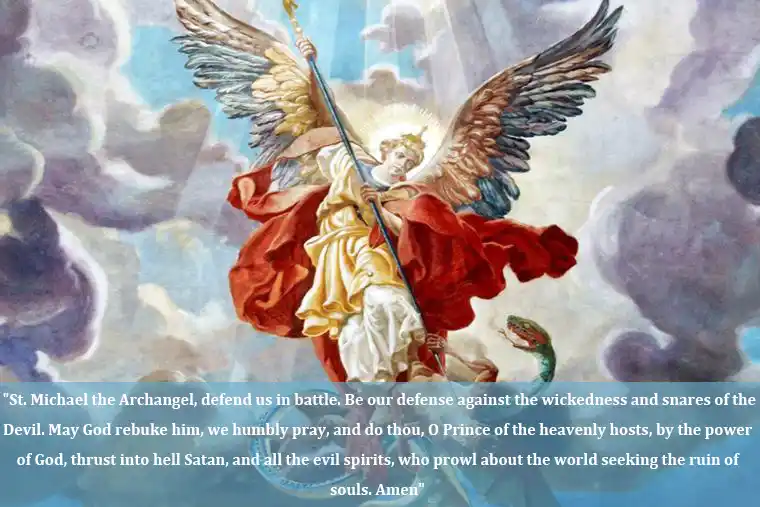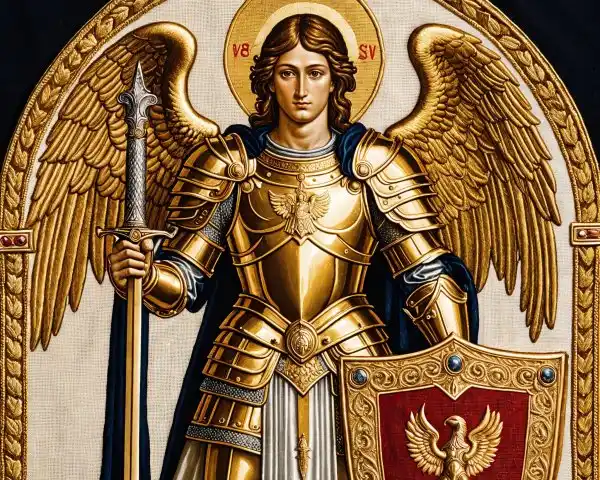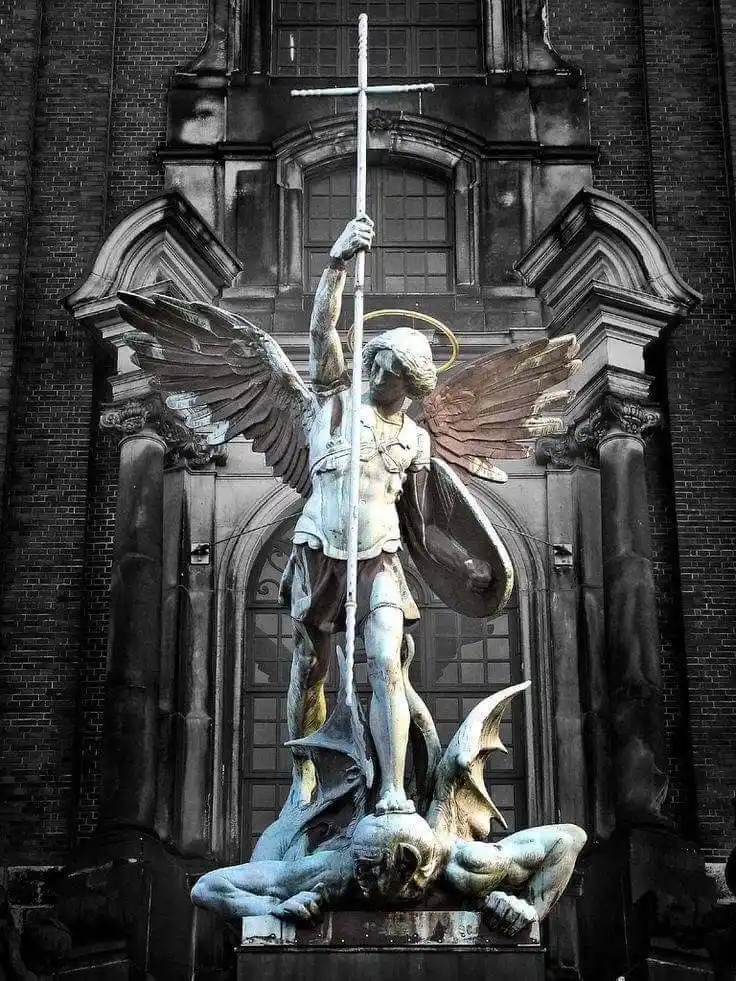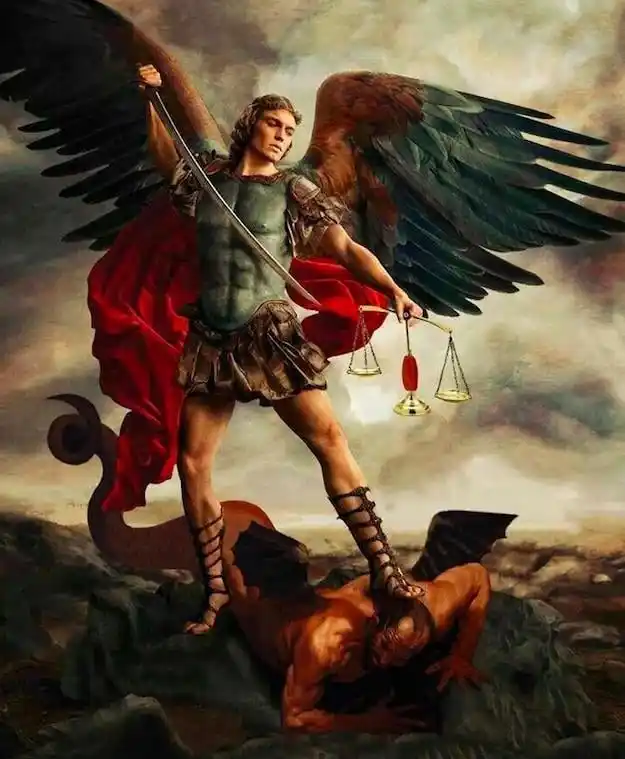Archangel Michael: Spiritual Meaning, Origins, and Characteristics

The Bible tells us very little about angels. Saint Michael is only mentioned around five times, so the mystery surrounding Michael is as you might imagine quite difficult to unpick and perhaps that’s what makes him so fascinating.
Yet despite his minuscule presence in the Bible, Archangel Michael has cultivated a massive devotion from not only those from the Christian faith but also the Jewish and Islamic faiths as well. In this article, I will be primarily focusing on Michael in the Bible to give you a picture of who Biblically accurate Saint Michael Archangel really is as well as what he means to people today.
Who is the Archangel St. Michael?
St. Michael, known as the chief archangel, is one of the most venerated angels in Christian, Jewish, and Islamic traditions. His name, derived from the Hebrew phrase “Mikhael,” translates to “Who is like God?”—a rhetorical question that underscores his unparalleled status among angels.
Michael is the only one in the Bible who is explicitly called an “archangel”. He is described as “the archangel Michael” (Jude 1:9) and is portrayed as a powerful figure who leads the armies of heaven against Lucifer and his forces (Revelation 12:7-9). Other angels, such as Gabriel, also play important roles, but none of them are given the title of “archangel” in the Bible, making Michael unique in this regard.
Michael is also hailed as a protector, a defender of the faith, and a leader of the heavenly hosts in the eternal battle against evil.
The Origins of Michael in the Bible
In the Bible, St. Michael is mentioned explicitly in the books of Daniel, Jude, and Revelation.
Archangel Michael’s first mention comes out of the Old Testament in the book of Daniel.
Daniel 10:13:
12 Then he said to me, “Do not fear, Daniel, for from the first day that you set your heart to understand, and to humble yourself before your God, your words were heard; and I have come because of your words.
13 But the prince of the kingdom of Persia withstood me twenty-one days; and behold, Michael, one of the chief princes, came to help me, for I had been left alone there with the kings of Persia.
14 Now I have come to make you understand what will happen to your people in the latter days, for the vision refers to many days yet to come.”
The speaker, most likely the angel Gabriel, came to Daniel three weeks after he saw another vision (Daniel 10:1-6). Here this angel explains why he came now. Daniel’s prayer was heard as soon as he began to pray. Yet the angel’s response was delayed. The explanation given here is that the angel was obstructed by the “prince of the kingdom of Persia. This impasse continued until the angel Michael came to assist.
Daniel 10:21:
20 Then he said, “Do you know why I have come to you? And now I must return to fight with the prince of Persia; and when I have gone forth, indeed the prince of Greece will come. 21 But I will tell you what is noted in the Scripture of Truth. (No one upholds me against these, except Michael your prince.
Michael is depicted as a powerful angelic figure, specifically referred to as “your prince”, denoting his role as guardian and protector, especially against spiritual forces opposing them.
Some believe that because the Prince of Persia lacked a true identity, he was probably some kind of demon. The term “prince” as used here may refer to a spiritual rank.
If this is the case, then we can derive from chapter 10 that angels and demons engage in spiritual battles. This passage emphasizes Michael’s power and authority in the spiritual realm where he possesses the power to dispel evil and has the power to fight demons that the other angels cannot handle on their own. This sets the tone for Michael’s role as a protector.
Daniel 12: 1:
1 At that time, Michael, the great prince, who stands watch over your people, will rise up. There will be a time of distress such as never has occurred since nations came into being until that time. But at that time all your people who are found written in the book will escape.
In this chapter, Michael is described as a “great prince” who guards the people of Israel, indicating his role as a powerful guardian angel who will protect them during a time of great tribulation, which is often interpreted as future persecution and hard times; essentially, Michael is seen as a warrior angel who will defend God’s elect.
Jude 1:9:
9 Yet Michael the archangel, in [f]contending with the devil, when he disputed about the body of Moses, dared not bring against him a reviling accusation, but said, “The Lord rebuke you!”
Here, the Michael is explicitly referred to as an Archangel.
Jude cites the story of the archangel Michael and the devil disputing over the body of Moses to warn against divisive, abusive, ungodly persons. They were so arrogant that they did what even the archangel would not do!
This story is not explicitly mentioned elsewhere in the Bible, it’s from Jewish tradition, as recorded in a non-Scriptural book titled The Assumption of Moses.
This passage proves that Michael was not only an archangel but also known for his humility, which is the opposite of the capital sin of pride.
Revelation 12:7–9:
7 And war broke out in heaven: Michael and his angels fought with the dragon; and the dragon and his angels fought,
8 but they did not prevail, nor was a place found for them in heaven any longer.
9 So the great dragon was cast out, that serpent of old, called the Devil and Satan, who deceives the whole world; he was cast to the earth, and his angels were cast out with him.
Most artistic depictions of Michael come from the Book of Revelation. In this verse, Michael is the leader of the angel armies, who engages Satan in a heavenly battle and ultimately casts him out of heaven.
The battle is often interpreted as a symbol of the ongoing spiritual struggle between good and evil, in which Michael represents the power of God.
What does Archangel Michael look like?
The Bible doesn’t provide much information about what the archangel Michael looks like, and artists and theologians have depicted him in a variety of ways, usually emphasizing his role as a warrior and protector.
Typically, Michael is portrayed as a tall, imposing figure, clad in armor and holding a sword or spear. In many artistic representations, Michael is shown with large, majestic wings, signifying his status as an angel and a messenger of God. These wings are often depicted as white or golden, further emphasizing his celestial origin. His face is usually calm and resolute, reflecting his unwavering commitment to his divine mission.

One of Michael’s most iconic images is that of him standing triumphantly over a dragon or demon, symbolizing his victory over evil. This image depicts his role as a warrior and reminds us of the ultimate triumph of good over evil.

In other depictions, Michael may be holding a sword in one hand and a pair of scales in the other to weigh the souls of the dead, or he may be holding the Book of Life (as described in the Book of Revelation) to show that he participated in the judgment. However, this form of depiction is not as common as dragon slaying. It appears mainly in Byzantine art.

What are the Duties of Archangel St. Michael and What Powers Does He Has?
As the leader of the heavenly army, Michael’s primary responsibility is to lead the fight against the forces of evil and darkness.
Michael is also revered as a healer and a source of strength for those in need. Many believers call upon him for protection, courage, and guidance in times of trouble or uncertainty. His powers are said to include the ability to banish fear, instill confidence, and provide clarity in moments of confusion.
In addition to his role as a protector, Michael is also seen as a judge and enforcer of divine justice. He is believed to weigh the souls of the departed, ensuring that they are judged fairly and justly. This aspect of his character highlights his dedication to truth and righteousness and his unwavering commitment to upholding God’s will.
What is the Archangel Michael’s spiritual meaning?
The spiritual meaning of Archangel Michael transcends his role as a warrior and protector. His presence is a reminder of the eternal battle between good and evil and the ultimate victory of light over darkness.
For many, the Archangel Michael is amongst us on earth, and his role as a divine protector has not changed over time. It is understood that many believers call upon Archangel Michael in times of need. Particularly in times of potential danger, in which Michael will answer them and deliver them safely in certain circumstances. Many believe that they can feel Archangel Michael’s presence when they have summoned him. Usually, if they have been successfully removed from a dangerous circumstance, or if they feel protected. Uplifting feelings of warmth, inner peace, and flashing lights are also said to be common signs that Archangel Michael is among those who have summoned him. Others claim to have even heard Archangel Michael speak to them with guidance, similar to how the unnamed man spoke to Daniel.
Can I wear St. Michael necklaces?
Yes, anyone can wear a St. Michael necklace, regardless of their religious beliefs.
Conclusion
The Archangel St. Michael is revered for his role as a protector, warrior, and spiritual guide. His presence in the Bible and religious art has inspired countless believers to seek his protection and guidance in their own lives. Whether depicted as a mighty warrior battling the forces of evil or a compassionate guide leading souls to heaven, Michael’s legacy continues to resonate across cultures and faiths.
Let’s end this post with a prayer to Saint Michael the Archangel:
“St. Michael the Archangel, defend us in battle. Be our defense against the wickedness and snares of the Devil. May God rebuke him, we humbly pray, and do thou, O Prince of the heavenly hosts, by the power of God, thrust into hell Satan, and all the evil spirits, who prowl about the world seeking the ruin of souls. Amen”
